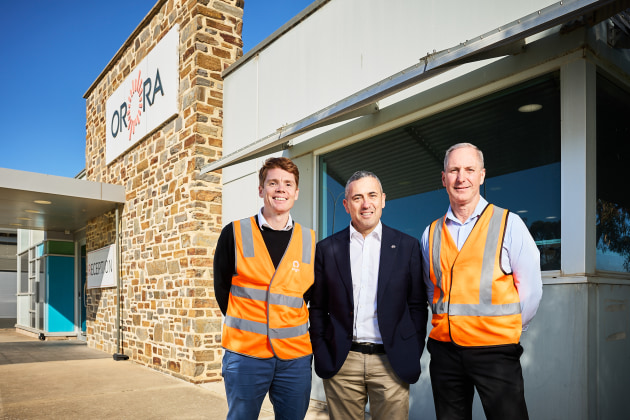Significant environmental gains will be delivered at the Orora glass bottle manufacturing plant in Gawler, thanks to a partnership with Origin Energy and a South Australian state government energy efficiency scheme.
Thousands of tonnes of glass will be recycled rather than wasted and greenhouse gas emissions reduced under initiatives approved by the Peter Malinauskas state government.
Orora employs nearly 400 people in SA, with its Gawler facility having capacity to manufacture up to one billion bottles a year.
The plant, the largest in Australia and one of the top 10 globally, makes a range of wine, spirit and beer bottles by using raw materials and recycled glass in its furnaces.
Orora already takes in about 80 per cent of the glass collected for recycling in SA through the container deposit scheme, and almost all of the glass collected in WA.
Two new projects will be implemented in a partnership between Orora and Origin – the first to be approved for large-scale facilities under the government’s Retailer Energy Productivity Scheme (REPS).
Energy savings of approximately $18 million over 10 years are expected to be achieved – calculated on the average cost for driving initiatives under REPS.
The scheme primarily assists low-income households to make improvements such as investing in energy-efficient appliances, or businesses to upgrade premises with better lighting or insulation. However, expanding eligibility to larger businesses will facilitate bigger overall energy savings and environmental benefits.
“We’re incredibly proud to be the first large-scale manufacturer in SA to initiate projects under the REPS. This will enhance energy efficiency and reduce carbon emissions at our facilities, in turn helping us achieve our sustainability goals, and benefiting the wider community,” said Greg Savage, general manager at Orora Beverage Glass.
“Our commitment to sustainability is clearly demonstrated through initiatives such as increasing the recycled content in the glass bottles we manufacture, as well as being at the forefront of new technologies such as oxygen-fuelled furnace.
“We’re proud to have worked with our long-term partner Origin to deliver the largest ever projects through the REPS, and we value the SA government’s support.”
The Malinauskas government welcomes other states now establishing their own CDS, creating the opportunity for Orora to gather more recycling glass.
Federal legislation has restricted the export of waste glass since 2020, making it more imperative to find ways to recycle glass within Australia.
To process more recycled glass for furnace use, Orora built a $25 million beneficiation plant, which opened at Gawler in 2022. The plant crushes, cleans and sorts the glass into what is known as ‘cullet’, which has a lower melting point than the raw materials of silica, limestone and soda ash traditionally used in glassmaking.
Using cullet reduces energy use as well as delivering the environmental benefit of diverting glass from landfill.
Orora is on track to increase the proportion of cullet from 38 per cent to more than 60 per cent, in line with its sustainability goals – provided it can source more glass from recycling schemes.
“These projects are practical steps on the road to decarbonising the SA economy. Reducing energy consumption and lowering emissions, while improving productivity is an all-round winner,” Koutsantonis said.
“Being more environmentally-friendly will be a competitive advantage for this SA manufacturing plant.
“This state is a national leader in producing high quality wine, beer and other beverages. It is only fitting that these drinks should be packaged in bottles made right here to the highest standards, and that we grow interstate and international trade opportunities for our manufacturers.”
Under the REPS initiative, Orora will develop supply lines to receive glass from existing container schemes in regional NSW, Queensland and the ACT. It will then target the new schemes in Victoria and Tasmania followed by expansion to other glass recycling projects.
In a second REPS initiative, Orora is upgrading one of its three furnaces to a more efficient, oxygen-fuelled technology. This is anticipated to reduce the emissions of carbon dioxide by 20 per cent, moving the furnace into the top 10 per cent of energy efficient furnaces in the world.
Retailers such as Origin must meet their targets by funding incentives for households and businesses to invest in energy efficiency. Under the two Orora projects, energy use will be reduced by some 1.8 million gigajoules.
“We are pleased to be able to assist our valued, long-standing customer Orora with their submission to have these two significant projects in Gawler supported under the SA REPS,” said James Magill, Origin’s executive general manager – Origin Zero.
“As the first large-scale facility initiative covered under the scheme, this approval will be instrumental in helping to bring these projects to life and will help Orora to reduce carbon emissions, improve energy efficiency and more broadly contribute to their overall sustainability targets.
“This project is an outstanding example of what is possible when the energy industry works in collaboration with industry and with government to find innovative energy efficiency solutions.”
The estimated value of the energy savings is $16-18 million for the two projects over 10 years, calculated on the average cost for driving initiatives under REPS (while not accounting for other factors including fluctuating energy prices and supplier contractual arrangements).
In related news, Orora also recently partnered with CleanCo to secure long-term supply of renewable energy for the company’s cans manufacturing facility in Rocklea, Queensland.







